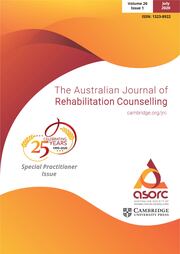No CrossRef data available.
Article contents
The Gazebo Café Skills Training Program — A Multi-perspective Evaluation
Published online by Cambridge University Press: 23 February 2012
Abstract
Interwork Limited is an open employment service that aims to maximise participation of individuals in the open labour market. As part of its services Interwork offers a Gazebo Café Program. The aim of this research project was to evaluate the impact of the participation in the Gazebo Café Program (a work preparation and skills training centre), from the perspective of key stakeholders. The rationale for this evaluation was to provide the management team of Interwork with information to inform decision-making for future directions of the Café. The project was undertaken as partial fulfilment of the requirements for the degree of Bachelor of Applied Science in Occupational Therapy with Honours. In-depth interviews were conducted with three consumers, as well as two focus groups with four employment coordinators, and two referring agency staff members respectively. Analysis of the data revealed seven themes. The results suggested that participation in the Gazebo Café Program was a positive experience. Consumers felt they developed functional skills. Employment coordinators and referring agency staff emphasised the impact of the development of social and interpersonal skills. Opportunities to experience meaningful occupation while performing the work role, all within a natural and supportive community environment were valued impacts. Issues were raised relating to finding the right composition of consumers with and without disabilities, the affordability of the services for external users, and the current unavailability of accredited training. While the findings expand upon existing literature, they describe impacts of participation in a transition program for consumers that appear to not have been described elsewhere. Information is provided to other service providers in regards to the value and impact of such a program. Implications for open employment services are discussed.
- Type
- Articles
- Information
- The Australian Journal of Rehabilitation Counselling , Volume 9 , Issue 1 , January 2003 , pp. 14 - 25
- Copyright
- Copyright © Cambridge University Press 2003


